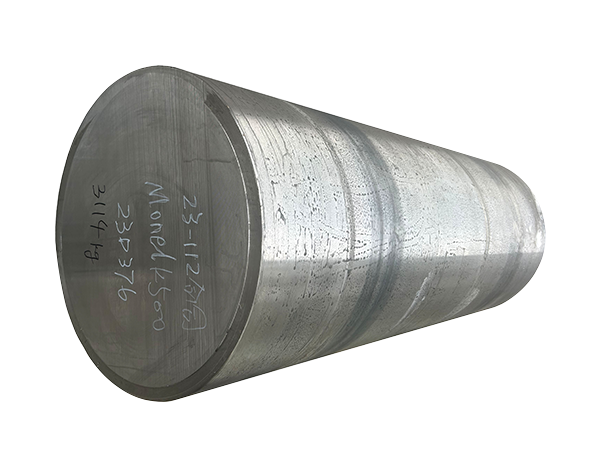Unveiling the Strength: Monel Alloy Forgings Explained
Release time:
2024-07-01 16:44
---
# Introduction
In the world of metallurgy and mining, the search for high-quality materials that can withstand extreme conditions is never-ending. One such material that has stood the test of time is Monel alloy. In this article, we will delve into the strength and versatility of Monel alloy forgings and explore why they are a preferred choice in industries such as metallurgy, mining, and energy.

## What is Monel Alloy?
Monel is a group of nickel alloys, primarily composed of nickel and copper, with small amounts of iron, manganese, carbon, and silicon. The high nickel content in Monel alloy provides excellent corrosion resistance, making it ideal for use in harsh environments.
### Properties of Monel Alloy
- Corrosion resistance
- High strength
- Excellent toughness
- Good thermal conductivity
- Low coefficient of thermal expansion
## Applications of Monel Alloy Forgings
Monel alloy forgings are widely used in various industries, including metallurgy, mining, and energy, due to their unique properties. Some common applications of Monel alloy forgings include:
- Pump and valve components
- Heat exchangers
- Marine equipment
- Chemical processing equipment
- Aerospace components
### Benefits of Using Monel Alloy Forgings
- Resistance to corrosion in acidic and alkaline environments
- High strength and durability
- Excellent resistance to high temperatures
- Low maintenance requirements
- Long-lasting performance
## How Monel Alloy Forgings Are Made
The process of manufacturing Monel alloy forgings involves several steps, including melting the raw materials, casting the alloy into ingots, forging the ingots into desired shapes, and heat treating the forgings to enhance their mechanical properties.
### Quality Control in Monel Alloy Forgings
Strict quality control measures are implemented throughout the manufacturing process to ensure that Monel alloy forgings meet industry standards for performance and reliability. This includes non-destructive testing, dimensional inspections, and material analysis.
## Frequently Asked Questions
1. What makes Monel alloy forgings suitable for high-performance applications?
Monel alloy forgings offer a unique combination of corrosion resistance, high strength, and durability, making them ideal for use in demanding environments.
2. How do Monel alloy forgings compare to other materials?
Compared to stainless steel and carbon steel, Monel alloy forgings provide superior corrosion resistance and mechanical properties, making them a preferred choice for critical applications.
3. Are Monel alloy forgings cost-effective?
While Monel alloy forgings may have a higher initial cost compared to other materials, their long-term performance and durability can result in cost savings over time due to reduced maintenance and replacement costs.
4. Can Monel alloy forgings be customized for specific applications?
Yes, Monel alloy forgings can be tailored to meet the unique requirements of different industries, with options for custom shapes, sizes, and surface finishes.
5. What industries commonly use Monel alloy forgings?
Metallurgy, mining, energy, aerospace, and marine industries are among the primary sectors that rely on Monel alloy forgings for their performance and reliability.
## Conclusion
In conclusion, Monel alloy forgings offer a winning combination of strength, durability, and corrosion resistance that make them a top choice for high-performance applications in the metallurgy, mining, and energy industries. With their unique properties and versatile applications, Monel alloy forgings continue to play a vital role in shaping the future of materials engineering.
Monel alloy forgings
Related News
The Art and Precision of Forging: Unlocking the Benefits of Precision Forging
2025-06-20
Precision forging is a sophisticated manufacturing process that significantly enhances the mechanical properties and dimensional accuracy of metal components. This technique involves shaping metal into desired forms through the application of high pressure, often at elevated temperatures. Unlike traditional forging methods, precision forging utilizes advanced technology and precise control mechani
Understanding Precision Forging: Key Insights for Professionals in Metalworking
2025-06-18
Precision forging is a sophisticated manufacturing process that involves shaping metal components through the application of controlled pressure and heat. This technique is distinguished by its ability to create parts with exceptional accuracy, consistency, and strength, making it a preferred choice in industries where precision is paramount. One of the primary advantages of precision forging is i
How Monel K500 Forging Enhances Corrosion Resistance in Metal Parts
2025-06-17
Introduction to Monel K500: The Corrosion-Resistant Metal Monel K500 is a nickel-copper alloy renowned for its exceptional corrosion resistance, strength, and versatility. It stands out in various industries, including marine, chemical processing, and aerospace, where metal components must endure harsh environments. This article delves into how the forging process of Monel K500 enhances its corr


